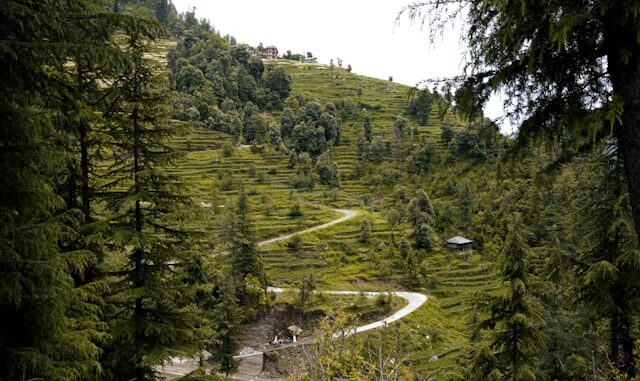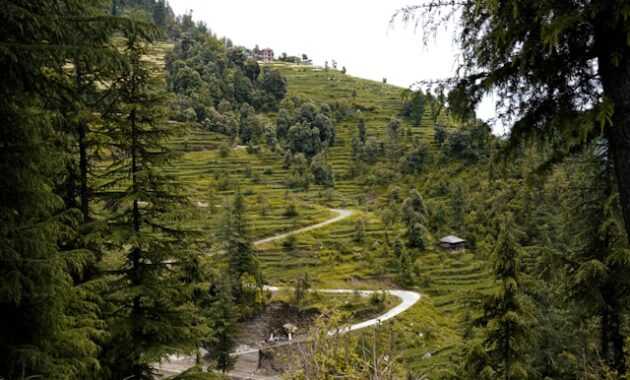
A Kingdom Rooted in Nature and Sustainability
Nestled in the heart of the Eastern Himalayas, Bhutan is a living testament to how tourism and environmental conservation can coexist in perfect harmony. With its rich biodiversity, pristine forests, and a culture deeply intertwined with nature, Bhutan has emerged as the ultimate destination for eco-tourism enthusiasts seeking authenticity, serenity, and sustainability.
What truly sets Bhutan apart is its unique approach to tourism: the “High Value, Low Impact” policy. Unlike mass-tourism models seen in other parts of Asia, Bhutan prioritizes quality over quantity, ensuring that every visitor contributes to the country’s conservation and social development.
Bhutan’s Commitment to Environmental Protection

Bhutan’s eco-tourism reputation is not just a marketing gimmick—it’s embedded in the national identity. The country is the only carbon-negative nation in the world, absorbing more carbon dioxide than it emits. This remarkable achievement is made possible through strict environmental laws, a constitution that mandates 60% forest cover at all times, and the active promotion of renewable energy sources like hydroelectricity.
National parks and wildlife sanctuaries, such as Jigme Dorji National Park and Royal Manas National Park, cover more than 50% of the country, forming a contiguous network of protected areas connected by biological corridors. These natural habitats are home to rare and endangered species like the snow leopard, red panda, and Bengal tiger.
Cultural Preservation Through Sustainable Tourism
Eco-tourism in Bhutan is not only about protecting nature—it’s also about preserving culture. Visitors experience authentic Bhutanese life through homestays, guided village tours, and traditional festivals. Local communities play an integral role in tourism, offering travelers immersive experiences in Bhutanese customs, cuisine, and crafts.
One of the most celebrated eco-cultural festivals is the Paro Tsechu, where locals and tourists alike gather to witness traditional mask dances and spiritual rituals that date back centuries. These events help to sustain local economies and preserve intangible heritage, all while minimizing environmental impact.
Trekking in Bhutan: Eco-Adventure at Its Finest
Bhutan offers some of the most spectacular and environmentally responsible trekking experiences in the world. Trails such as the Druk Path Trek, Snowman Trek, and Jomolhari Trek take hikers through alpine meadows, ancient monasteries, and Himalayan panoramas.
All treks are carefully regulated to ensure that natural ecosystems are not disturbed. Licensed guides, eco-friendly camping practices, and waste management protocols are strictly enforced. These initiatives not only safeguard the environment but also enhance the quality of the trekking experience.
Bhutan’s Unique Tourism Model: A Case Study in Sustainable Travel
Unlike other countries where eco-tourism is a niche market, in Bhutan, sustainable travel is the standard. The government levies a daily Sustainable Development Fee (SDF) on foreign tourists, which supports free healthcare, education, and environmental conservation.
This model limits the number of tourists, thereby reducing strain on natural and cultural resources. More importantly, it ensures that tourism benefits local communities directly, creating jobs and funding infrastructure without compromising Bhutan’s ecological integrity.
Eco-Lodges and Green Accommodations
Accommodations in Bhutan reflect the nation’s environmental consciousness. Many hotels and guesthouses are built using traditional materials, designed to blend seamlessly into the natural landscape. Properties like Gangtey Lodge, Amankora, and Six Senses Bhutan offer luxury with minimal environmental impact, using solar power, rainwater harvesting systems, and organic locally sourced food.
Even budget travelers will find eco-friendly options, including community-run lodges and homestays that practice zero-waste policies and promote eco-education among guests.
Bhutan’s Biodiversity: A Living Paradise for Nature Enthusiasts
Home to over 770 bird species and 5,400 plant species, Bhutan is a biodiversity hotspot. The country’s varied climate zones—from subtropical plains to alpine tundra—support a stunning range of flora and fauna.
Eco-tourism programs include birdwatching tours, wildlife safaris, and botanical excursions, guided by local naturalists who ensure respectful, non-invasive interaction with the environment. Photographers, biologists, and nature lovers are drawn to Bhutan’s untouched wilderness, where each encounter with wildlife feels sacred.
Education and Community Empowerment through Eco-Tourism
Bhutan’s eco-tourism initiatives are deeply rooted in education and community empowerment. Local villagers are trained as tour guides, cooks, porters, and artisans. Tourists, in turn, participate in volunteer programs ranging from organic farming to reforestation projects.
Educational programs like the Bhutan Ecological Society and Royal Society for Protection of Nature work with schools and communities to promote conservation. These efforts ensure that eco-tourism is not just sustainable but transformational, instilling a sense of stewardship across generations.
Responsible Travel Guidelines in Bhutan
Bhutan encourages travelers to respect cultural traditions and natural habitats. Tourists are briefed on eco-friendly practices such as carrying reusable bottles, minimizing plastic use, and adhering to designated trekking paths. Ethical tourism in Bhutan is a two-way street, with both hosts and visitors working together to preserve the country’s pristine environment.
The Future of Eco-Tourism in Bhutan
As climate change and overtourism continue to threaten global ecosystems, Bhutan stands as a beacon of hope and a model for the world. The country’s holistic approach to development—guided by its Gross National Happiness (GNH) philosophy—ensures that progress never comes at the cost of nature.
Future initiatives include expanding green infrastructure, promoting carbon-neutral transportation, and enhancing digital platforms for eco-tourism education. With continued commitment, Bhutan is poised to remain the world’s best-kept secret for eco-tourism, offering travelers not just a destination, but a deeper connection to the planet.